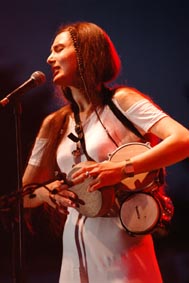
(….)I've produced four CDs, and I'm busy recording a fifth. I have some other compositions as well. I haven't written them all down, but I remember them well and perform them at concerts. To tell you the truth, I don't have the patience to write them all down. It takes a long time and it's very difficult. When I perform, I improvise a lot. My compositions are really quite different from classical jazz.
(..)I think of my performances as musical meditations. I want my music to inspire people to live their lives without fighting, without war, without jealousy and without hating each other. Those are the saddest aspects of human experience.
(…)When I perform and play my jazz compositions, I often accompany myself with what is known as scat singing. It's just another extension of my intensity when I play. It's characteristic of me. I really don't know of any Azeri tradition that uses it.
My own background is classical music, and I'd have to admit that it has turned out to be extremely valuable, providing an excellent foundation for intellectual growth. That's the brain part. But then, a person like me needs to give spontaneous expression to the inner self and soul, to the heart.
(…)Some people expect me to practice a lot and are rather surprised when I tell them I don't understand what "practice" means. Instead, I understand inspiration. I don't think you should touch the piano when you don't have the right inspiration or else you'll play badly, and that's a sin
(…)Sometimes, I don't even remember all the cities I've performed in. For me, the stage is my motherland, so I feel very much at home wherever I perform. I don't get nervous in front of all those people. I love large crowds. I'm very comfortable when I get to perform in front of several thousand people
(…)Mugam is the main musical inspiration in my jazz compositions. How can I describe mugam? Well, mugam is magical music. I don't use it in its typical traditional form. I mix it with other forms, like classical or avant-garde music. Mugam has a great ability to charm and mesmerize, almost hypnotize. It's so deep. I've noticed that it doesn't matter where I perform it, people always identify very deeply with it in every country. Mugam is very, very profound
(…)My audiences understand mugam-believe me, they really understand it. They feel it. Maybe they can't define it or analyze it theoretically, but that's not so important. But they can feel it. And I sense that they feel me. They understand quite deeply what's going on


0 Comments:
Post a Comment
<< Home